New planes and routes as aviation picks up
US giant Boeing will host the its Aerospace Industry Forum in Hanoi on August 25 to discuss its supply chain development plan, aerospace manufacturing in Vietnam, and the group’s future strategies.
The move is being made with the local aviation sector recovering well, which in turn is expected to require more aircraft and growing aerospace manufacturing in the months to come. This is intensified by recent visits by senior leaders of Boeing to Vietnam, including Michael Arthur, senior vice president of Boeing and president of Boeing International in June.
According to Arthur, Boeing has identified Vietnam as an important market for its further expansion. “Boeing is determined to be a bigger part of the story in Vietnam, which is why I have come here and why we have opened an office here,” he said during the visit.
Boeing has suppliers from businesses in Vietnam that works with it directly and indirectly through partners in Japan and South Korea, among others. “So, on every new Boeing aircraft, there is a piece of Vietnam. We would like that piece to be bigger, and that’s the purpose of expanding our operation in the country,” Arthur added.
Boeing is interested in helping Vietnam develop the aviation ecosystem as this sector is set to develop quickly in future, as well as in digital transformation and sustainable development. It also wants to expand its facilities in Vietnam and is looking to find opportunities to cooperate. Boeing also plans to open maintenance and warranty facilities in Vietnam and develop long-term partnerships.
To this end, Boeing is facilitating new aeroplane leases, sourcing parts from companies based in Vietnam, and working with the Civil Aviation Administration of Vietnam (CAAV) and the country’s airlines to provide on-the-job training as well as helping Vietnam meet International Civil Aviation Organization standards.
As part of the strategy, in June, Boeing worked with Vietnam Air Traffic Management Corporation to strengthen cooperation with Vietnam in air traffic management.
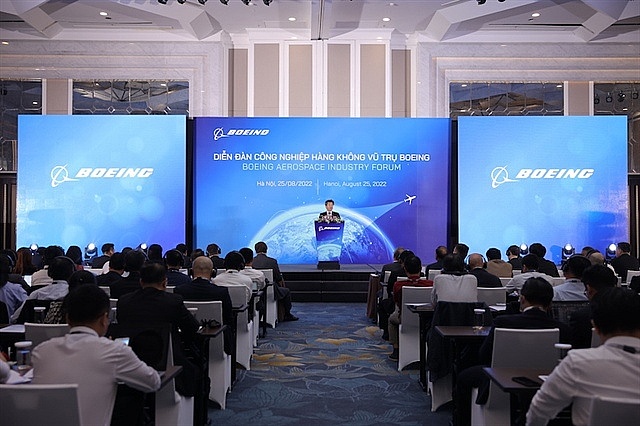 |
| An overview of the forum on August 25 in Hanoi. Photo: Boeing |
Increasing efficiency
Like Boeing, Airbus is expanding its footprint in Vietnam. This ambition was shown by the demonstration tour of the new Airbus A220 in Hanoi in May, making the Southeast Asian country one of the first destinations in the journey.
In Vietnam, Airbus has a presence in the airline market with Bamboo Airways, Pacific Airways, Vietnam Airlines, and Vietravel operating the A320 family, and Vietjet and Vietnam Airlines operating the A330 and A350. Its industrial cooperation programmes create jobs for more than 1,500 skilled workers in the country, making Vietnam an important industrial partner in Southeast Asia.
Together with Airbus and Boeing, aircraft spare part manufacturers are eyeing opportunities in the promising aviation sector. Last month, Japan’s Onaga Company attained an investment certificate to develop a factory manufacturing aircraft and automobile components in Hanoi Southern Supporting Industrial Park. It aims to become operational next year.
Moves like these are reflecting the global trend of diversifying partnerships as a focus in many industries and sectors, including aviation, to increase efficiency in targeted nations.
Prof. Dang Dinh Dao, former head of the Institute for Economics and Development Studies at the National Economics University, said, “It is easy to understand why private investors and businesses are interested in airport infrastructure and logistics in Vietnam because it offers much promise for growth in the future.”
With airlines often leading in infrastructure development, this provides opportunities for Boeing, Airbus, and other international manufacturers to access the infrastructure to support them, thus driving their business growth in the country.
Vietnam is planning to build 6-7 new airports by 2030, according to a plan recently submitted to the government by the Ministry of Transport, thus increasing its airports to 28 by 2030 with a total capacity of 278 million passengers per year. The country is working on a scheme to attract private investment in airport projects such as these.
Going digital
Air carriers in Vietnam expect to develop their aircraft to better serve rising travel demands. Bamboo Airways is operating about 60 domestic air routes and 12 international ones, and plans to increase flight frequency and expand its fleet and international network. The airline is expecting to introduce the A321Neo and Boeing 787-9 Dreamliner in this quarter.
Meanwhile, budget carrier Vietjet in July signed an agreement with Boeing to reaffirm a previously announced order for 200 737 MAX aircraft after an interruption, because of the 737 Max’s suspension and the impacts of the pandemic on Boeing’s global supply chain.
As part of the deal, Boeing will support Vietjet with technical services, training, technology transfer, and research and development to ensure lasting and sustainable growth with the highest levels of efficiency, reliability, and affordability.
Air carriers are increasingly heading towards digital transformation. For instance, national flag carrier Vietnam Airlines has been focusing on upgrading its technical infrastructure, e-commerce website, and mobile app, while moving many activities into the digital environment to increase operational efficiency.
Vietjet is bringing many services to the digital environment such as AI, robotics, and tech-based courier Swift247.
The CAAV forecast the number of air passengers in Vietnam could reach 87.8 million this year, an increase of 190 per cent against 2021, with the number projected to reach 275.9 million by 2030.
Tran Tho Dat, member of the Prime Minister’s Economic Advisory Group said, “The recovery of tourism has been creating favourable conditions for Vietnam’s aviation, thus enabling airlines to not miss the recovery path amid competition among regional and global rivals.”
| Dr. Bui Doan Ne Secretary general, Vietnam Aviation Business Association The Vietnam Aviation Business Association proposes that the state continues investment in developing and enlarging the aviation infrastructure system and other aviation-related systems. Moreover, the government needs to have policies to leverage private investment and other public-private partnership models to diversify and speed up the upgrading and enlargement of the aviation infrastructure system to meet market demands, as well as to innovate management to increase operational efficiency. The country should also prepare for and soon make negotiations with countries with promising aviation markets that Vietnam can tap into, thus facilitating penetration of Vietnamese airlines. |
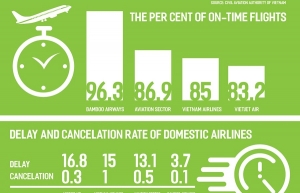 | Airline delays increase during peak season Vietnam’s aviation authority is placing strict requests on airlines to ensure smoother operations, as the rest of the summer promises continued flight delays and cancellations. |
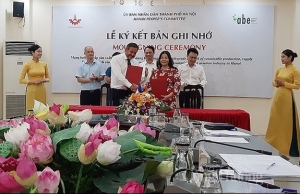 | Hanoi partners up with French business in aviation industry The Department of Industry and Trade of Hanoi on August 23 inked an MoU with French company Advanced Business Events (ABE) on cooperation in developing a high-grade network of sustainable production, supply and consumption in the aviation industry. |
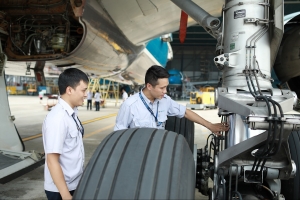 | Investors to be selected for components of Long Thanh International Airport The Civil Aviation Authority of Vietnam (CAAV) is now selecting investors for maintenance workshops and ground-handling services, which is a part of subproject four of Long Thanh International Airport. |
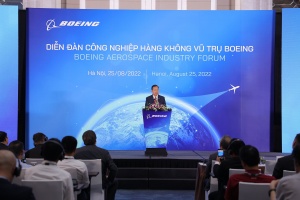 | Boeing eyes supply chain expansion in Vietnam Boeing is planning to seek more suppliers in Vietnam to expand its supply chain network and tap into growing demands. |
What the stars mean:
★ Poor ★ ★ Promising ★★★ Good ★★★★ Very good ★★★★★ Exceptional
Related Contents
Latest News
More News
- Vietnam, New Zealand seek level-up in ties (February 19, 2026 | 18:06)
- Untapped potential in relations with Indonesia (February 19, 2026 | 17:56)
- German strengths match Vietnamese aspirations (February 19, 2026 | 17:40)
- Kim Long Motor and AOJ Suzhou enter strategic partnership (February 16, 2026 | 13:27)
- Haiphong welcomes long-term Euro investment (February 16, 2026 | 11:31)
- VIFC in Ho Chi Minh City officially launches (February 12, 2026 | 09:00)
- Norfund invests $4 million in Vietnam plastics recycling (February 11, 2026 | 11:51)
- Marico buys 75 per cent of Vietnam skincare startup Skinetiq (February 10, 2026 | 14:44)
- SCIC general director meets with Oman Investment Authority (February 10, 2026 | 14:14)
- G42 and Vietnamese consortium to build national AI infrastructure (February 09, 2026 | 17:32)

 Tag:
Tag:
















 Mobile Version
Mobile Version